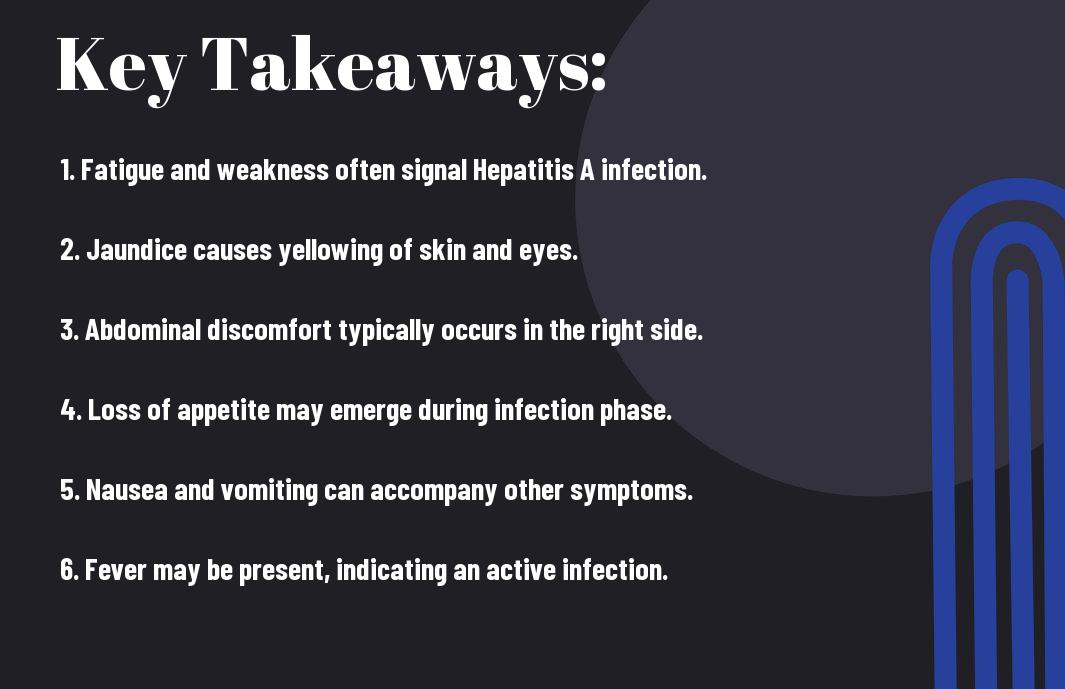You may not realize that Hepatitis A can affect your liver, potentially leading to serious health issues. Understanding the symptoms of this viral infection is important for your well-being. Common signs can include fatigue, jaundice, nausea, and abdominal discomfort. By recognizing these symptoms early, you can take proactive steps to protect yourself and seek medical advice promptly. In this post, we will explore the key indicators of Hepatitis A that you should be aware of to ensure your health and safety.

Understanding Hepatitis A
Your awareness of Hepatitis A is crucial for your health. This infectious disease affects the liver and is typically caused by the Hepatitis A virus (HAV). The virus is often spread through contaminated food and water and can lead to a range of health issues if left unchecked.
What is Hepatitis A?
What you should know about Hepatitis A is that it is a highly contagious liver infection caused by the Hepatitis A virus. Unlike other forms of hepatitis, Hepatitis A does not lead to chronic liver disease and can often resolve on its own, but it can still cause significant discomfort and fatigue during its course.
Transmission and Risk Factors
The transmission of Hepatitis A primarily occurs through the ingestion of contaminated food or water. You may also be at risk if you come into close contact with an infected person or share personal items. Key risk factors include:
- Traveling to regions with high infection rates
- Consuming raw or undercooked shellfish
- Poor sanitation and hygiene practices
- Close contact with an infected individual
Knowing these risk factors can empower you to take preventative measures against the virus.
Consequently, it is vital for you to understand the environments and behaviors that elevate your risk of Hepatitis A infection. More specifically, you should pay attention to:
- Dining at establishments with questionable sanitation
- Participating in communal recreational activities
- Practicing inadequate hand hygiene
- Not vaccinating before traveling to high-risk areas
Knowing these transmission modes will help you make informed decisions to protect your health.
Early Symptoms of Hepatitis A
You may experience early symptoms of Hepatitis A within two to six weeks after exposure to the virus. These symptoms can resemble those of the flu and often include fatigue, nausea, loss of appetite, and mild fever. The manifestation of these symptoms indicates your body's immune response to the infection. Recognizing these signs early is important for proper management and recovery.
Initial Signs to Watch For
Any signs such as fatigue, headache, or stomach discomfort can indicate the onset of Hepatitis A. Additionally, you may notice dark urine and clay-colored stools, which are key symptoms that can signal liver involvement. If you observe these symptoms, it’s advisable to consult a healthcare professional to ensure proper diagnosis.
Duration of Early Symptoms
Below the initial signs typically last for about one to two weeks, but their intensity can vary among individuals. You might notice that these symptoms gradually worsen before improving, as your body fights the virus.
And while some people may recover completely within a few weeks, others may experience lingering symptoms for a longer duration. It's important to monitor your health closely and seek medical advice if symptoms persist or worsen, as early intervention can help mitigate complications associated with Hepatitis A.
Common Symptoms of Hepatitis A
Despite being a viral infection, hepatitis A often presents with a range of symptoms that can affect your overall well-being. Many people experience a combination of gastrointestinal issues, fatigue, and jaundice. As the infection progresses, recognizing these symptoms can help you seek timely medical attention and improve your recovery prospects.
Gastrointestinal Symptoms
The most common gastrointestinal symptoms associated with hepatitis A include nausea, vomiting, abdominal pain, and diarrhea. These symptoms can cause significant discomfort and may lead you to avoid eating altogether. As the infection affects your liver function, these GI issues can become more pronounced over time.
Other Common Symptoms
Along with gastrointestinal symptoms, you may also notice other common signs such as fatigue, fever, and dark urine. Many individuals experience general malaise, which can make day-to-day activities feel overwhelming. It’s crucial to pay attention to these indicators to understand your health better.
At times, you might develop additional symptoms like joint pain or an itchy rash. These variations can differ from person to person, and while not everyone will experience all symptoms, being aware of them can aid in early detection. Engaging with healthcare providers about these symptoms can ensure a proper diagnosis and effective management plan for your condition.
Severe Symptoms and Complications
Unlike mild cases, severe symptoms of Hepatitis A can indicate significant health issues. You may experience intense abdominal pain, persistent vomiting, jaundice that spreads or worsens, and dark urine. Consult Clinical Signs and Symptoms of Hepatitis A to understand more about these markers and what they could mean for your health.
Signs of Severe Hepatitis A
After experiencing mild symptoms, if you notice a sudden deterioration such as extreme fatigue, confusion, or heavy bleeding, it can signal severe Hepatitis A. These manifestations should not be overlooked, as they suggest your liver may be significantly affected and require immediate attention.
When to Seek Medical Attention
Complications from Hepatitis A aren’t uncommon, and you should seek medical attention promptly if you exhibit severe symptoms. If you find yourself unable to stay hydrated, experience a significant change in consciousness, or have persistent fever, these can be serious indicators. Hepatitis A may provoke liver failure, necessitating urgent evaluation and treatment.
Hepatitis A can escalate quickly, so if you find symptoms intensifying or developing rapidly, don't hesitate to contact a healthcare professional. Timely intervention can make a significant difference in your recovery and overall health. Always prioritize your well-being by recognizing the importance of proper medical guidance when illness strikes.

Diagnosis of Hepatitis A
Once again, if you suspect you might have Hepatitis A, seeking an accurate diagnosis is necessary. Your healthcare provider will evaluate your symptoms and may perform blood tests to check for antibodies against the virus. For more on the symptoms to watch for, read about the 7 Common Signs of Hepatitis.
Diagnostic Tests and Procedures
An effective diagnosis of Hepatitis A involves blood tests that look for immunoglobulin M (IgM) antibodies, which indicate a current infection. These tests can confirm if you have been recently infected and help rule out other types of hepatitis.
Importance of Early Diagnosis
Beside managing your symptoms effectively, early diagnosis of Hepatitis A can help prevent the spread of the virus to others and enable you to take necessary precautions to protect your health.
Even a prompt diagnosis allows you to focus on recovery and understand your condition better. By knowing your health status early, you can receive appropriate medical advice, avoid exposure to certain substances, and make informed choices about your lifestyle to support your liver health during recovery.
Prevention and Vaccination
After understanding the symptoms of Hepatitis A, you should focus on prevention and vaccination. The hepatitis A vaccine is safe and effective, providing long-lasting protection against the virus. By taking preventative measures and getting vaccinated, you can significantly decrease your risk of contracting Hepatitis A, ensuring your overall health and well-being.
Vaccination Recommendations
About 1 to 2 weeks before travel to high-risk areas, you should receive the hepatitis A vaccine for optimal protection. The vaccination is typically given in two doses, with the second dose administered six months after the first. It's advisable to consult your healthcare provider to discuss your individual situation and any specific recommendations.
Preventative Measures
The key to preventing Hepatitis A extends beyond vaccination. You must practice good hygiene, such as washing your hands thoroughly with soap and water, especially before eating and after using the restroom. Additionally, avoiding consumption of contaminated food and water is vital, particularly when traveling to areas where the virus is prevalent.
But good hygiene practices are not the only defense against Hepatitis A. You should also consider avoiding raw or undercooked shellfish and drinking bottled or boiled water while abroad. Properly washing fruits and vegetables before eating can further reduce your risk. Staying informed about local health advisories and ensuring you receive any additional vaccinations recommended for your travel destination will help you safeguard your health effectively.
Final Words
The symptoms of Hepatitis A can often be mild but recognizing them early is important for your health. You should be aware of symptoms such as fatigue, nausea, abdominal discomfort, and jaundice. By staying informed and seeking medical advice if you experience these signs, you can take proactive steps in managing your health and preventing the spread of the virus. Staying vigilant is key to ensuring a swift recovery and protecting yourself and those around you.
FAQ
Q: What are the common symptoms of Hepatitis A?
A: Common symptoms of Hepatitis A include fatigue, nausea, abdominal pain, loss of appetite, low-grade fever, and jaundice (yellowing of the skin and eyes). These symptoms typically appear two to six weeks after exposure to the virus.
Q: How long do Hepatitis A symptoms typically last?
A: Symptoms of Hepatitis A usually last from a few days to several weeks. In most cases, the illness resolves within two months, but some individuals may experience prolonged symptoms lasting up to six months.
Q: Can Hepatitis A be asymptomatic?
A: Yes, some individuals infected with Hepatitis A may not show any symptoms at all, particularly children under the age of six. Even in the absence of symptoms, the virus can still be present in their bodies and potentially spread to others.
Q: What are the serious signs of Hepatitis A that require medical attention?
A: Serious signs that require immediate medical attention include severe abdominal pain, persistent vomiting, confusion or altered mental state, dark urine, pale stool, or severe jaundice. These symptoms may indicate complications and should not be ignored.
Q: How can I differentiate Hepatitis A symptoms from other illnesses?
A: Differentiating Hepatitis A symptoms from other illnesses requires a careful observation of the combination of symptoms. Symptoms such as sudden onset of fever, nausea, and jaundice, especially following exposure to contaminated food or water, are strong indicators. Consultation with a healthcare professional is crucial for an accurate diagnosis.

0 Comments